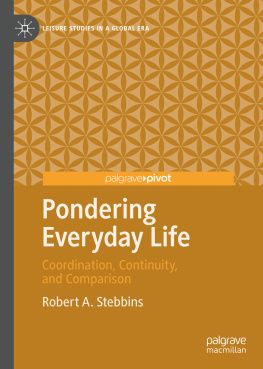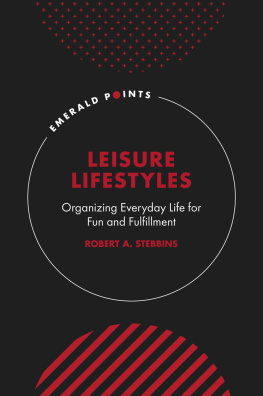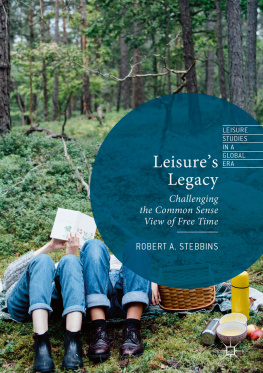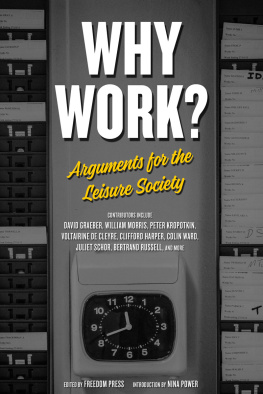Emerald Publishing Limited
Howard House, Wagon Lane, Bingley BD16 1WA, UK
First edition 2021
Copyright 2021 Robert A. Stebbins. Published under exclusive licence by Emerald Publishing Limited
Reprints and permissions service
Contact:
No part of this book may be reproduced, stored in a retrieval system, transmitted in any form or by any means electronic, mechanical, photocopying, recording or otherwise without either the prior written permission of the publisher or a licence permitting restricted copying issued in the UK by The Copyright Licensing Agency and in the USA by The Copyright Clearance Center. Any opinions expressed in the chapters are those of the authors. Whilst Emerald makes every effort to ensure the quality and accuracy of its content, Emerald makes no representation implied or otherwise, as to the chapters' suitability and application and disclaims any warranties, express or implied, to their use.
British Library Cataloguing in Publication Data
A catalogue record for this book is available from the British Library
ISBN: 978-1-80071-017-7 (Print)
ISBN: 978-1-80071-016-0 (Online)
ISBN: 978-1-80071-018-4 (Epub)
Preface
Over the years, I have written off and on about non-work obligation defined as disagreeable activities that are neither work nor leisure. This book pulls together much of that writing, while adding many new ideas which emerged as I started to put everything together. It bears on both work and leisure, but indirectly so. Scholars in both fields have mostly ignored this third domain of life, on the grounds, I suspect, that it appears to be of no concern to them. As an excuse, such an attitude is myopic, for non-work obligations negatively affect our well-being and the positive side of our lifestyles and can demand that we engage in some voluntary simplicity to mute their impact. The first two in this list are of great concern in leisure studies and stir the interest of some of those who study work. Additionally, the current research interest on worklife balance cannot afford to ignore the effects that non-work obligation has on it. Consumer studies specialists will be interested in the purchase of goods and services related to these obligations.
Chapters 1 and 2 are primarily conceptual. Enough of the serious leisure perspective is set out in the first chapter to enable me to link it later in the book with non-work obligations treated of as distinct activities. Chapter 2 is devoted to defining those obligations. In the next chapter, we explore the personal meaning of non-work obligations and then, expanding the scope of the analysis, we look in Chapter 4 at the lifestyle of non-work obligation that takes shape across the years. In this context, I discuss worklifeobligation balance and people's efforts to implement some measure of voluntary simplicity as the years pass. Chapter 5 is devoted to the social world of non-work obligations and the culture in which they are embedded. We return in Chapter 6 to the matter of definition of non-work obligation. This is also the place to consider the disagreeable personality, which is not always, however, a non-work activity, but rather an adventitious encounter with such a person while at work or leisure. Nonetheless, disagreeable people can routinely haunt recurring free-time gatherings. Finally, the difference between responsibility and duty in non-work obligation is clarified at this point as is the question of the degree of disagreeableness experienced when we confront odious duties and responsibilities of a diverse sort.
1
Introduction
Most people in Western society, and possibly many of those outside it, have a binary view of life: what they do for their livelihood (work) is disagreeable and what they do for leisure outside work is agreeable. To be sure, what is positive and what is negative to the individual is subject to much interpretation, such that widespread consensus on these two dimensions is sometimes hard to find. Nevertheless, for most people, the core, or essential, activities constituting their employment are disagreeable in some measure, to be avoided were it not for the uncomfortable fact that it is through them that they sustain life.
In this mix of attractive and unattractive activities, people in the West also encounter a third, vaguer domain of obligations that are neither work nor leisure. They are by definition disagreeable, for were they seen as agreeable, they would be defined as leisure or as devotee work (discussed later in this chapter). These obligatory activities are often viewed negatively, among them raking leaves, shoveling snow, and caring for an incapacitated relative, identified at times in common sense as chores and sometimes as duties.
In short, to many people, non-work obligations make up a substantial part of the gloomy, negative side of everyday life. As such, they help undermine our overall positiveness as found in well-being, quality of life, and feelings of happiness. Moreover, the time and effort spent meeting them is therefore not available for leisure interests and those of devotee work. For the self-employed, non-work obligations may also cut into the pursuit of activities comprising part of their work.
These personal conditions are the focus of Chapter 3. Chapter 2 is devoted to the details of the non-work obligations. They merit closer examination than the scant attention given to them in the work-leisure literature, in part, because they can affect in diverse ways how people pursue their work and leisure activities and experience well-being. Moreover, though chores are disagreeable, their completion or its absence can sometimes have an impact on, for example, the neighborhood, local networks, wider community, and even on certain international circles.
Theoretic Background
Over the years, I have been treating of non-work obligations as one of three domains (first set out in Stebbins, 2009, Chapter 1). A domain is an area of social and personal life the boundaries of which are circumscribed by the totality of activities associated with a common, broad human interest. So far I have been able to determine there are three such domains: work, leisure, and non-work obligation. The first two are conventionally conceived of as social institutions, whereas the third is not. Indeed, the third, though vaguely recognized in everyday life, is little recognized in social theory if recognized at all there.
Obligation outside that experienced while pursuing a livelihood is terribly understudied. Much of it falls under the heading of family and/or domestic life. Obligatory communal involvements are also possible, though they, too, are sometimes seriously misunderstood (exemplified in coerced volunteering). To speak of obligation is to speak not about how people are prevented from entering certain leisure activities the object of much of research on leisure constraints but about how people fail to define a given activity as leisure or redefine it as other than leisure, as an unpleasant obligation. Obligation is both a state of mind, an attitude a person feels obligated and a form of behavior, he must carry out a particular course of action, engage in a particular activity. But even while obligation is substantially mental and behavioral, it roots, too, in the social and cultural world of the obligated actor. Consequently, we may even speak of a culture of obligation that takes shape around many work, leisure, and non-work activities (see below).














